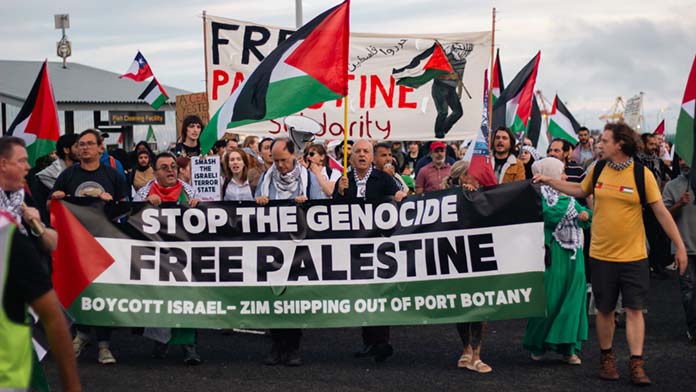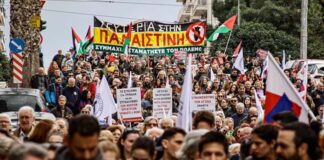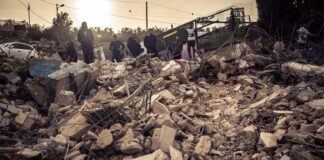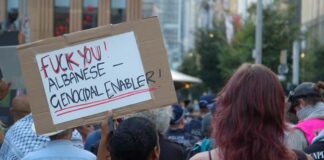1. Palestine is at the centre of world politics
The Hamas-led break out from the Gaza concentration camp on 7 October has forced Palestine to the centre of world politics. Israel’s genocidal response has taught the world the nature of its 75-year campaign to snuff out Palestinian identity, and Palestinian resistance.
The unprecedented massacre of children in Gaza by Israel, the deliberate starvation of 2.5 million people, the calculated deprivation of water, aid and medical care, and the displacement of 1.7 million Gazans is one of the worst horrors any of us have lived through.
And it is being perpetrated mere kilometres away from world-class hospitals, plentiful fresh water and nutritious food in Israel. All the scientific and economic innovations of the capitalist system have been used to create AI-guided weapons that incinerate, pulverise and precision-target the houses of journalists, doctors, refugee camps, hospitals and any sanctuaries which thousands of desperate Gazans have fled to.
But the heroic struggle of the Palestinian people, continuing to resist in the face of the overwhelming military power concentrated against it, has inspired a mass, global movement. Palestinians have a right to resist. They have been occupied since 1948. Gaza has been subject to a complete siege by Israel since 2007. Hamas has been the elected government of the Gaza Strip since 2006; it is part of the Palestinian resistance.
2. From the River to the Sea
Palestinian liberation requires the complete dismantling of the apartheid Israeli terror state. Were it to meet the most basic Palestinian demands: the right of return for Palestinian refugees, equal rights and political representation, Israel could no longer continue to be a launch-pad for American domination of the Arab world.
Democracy in the lands between the Jordan River and the Mediterranean Sea would necessitate the end of Israel as a loyal racist settler state constantly threatening war against its Arab neighbours. The US NEEDS an apartheid Israel to maintain its control of the Middle East and is 100 per cent committed to the ethnic supremacy of Jews in historic Palestine. Therefore the struggle for a free Palestine requires a struggle to dismantle the imperialist system and end US domination in the Middle East.
3. US Imperialism and resistance in the Arab World
The US is no longer the unrivalled global superpower it once was. It has been weakened by economic competition from China, and military defeat in the wars in Iraq and Afghanistan. However, the size and reach of US military power still makes it the dominant global power, as can be seen by its role in using Ukraine in its proxy war against Russia.
The fight to overturn US imperial domination of the Middle East will not come from the corrupt dictatorships of the Arab world – Jordan, Egypt, Saudi Arabia, UAE etc. who have all made their peace with the US and Israel. Nor will it come from the ostensibly anti-US forces such as Iran or Syria, which have benefited from America’s defeat in Iraq to extend their regional power while they terrorise their own populations.
The force that can bring Israel and its US backers to their knees lies in the grassroots revolutionary struggle of millions of Arab workers who yearn for an end to the killing and humiliation in Palestine. Exploited and oppressed workers are the ones whose labour is required to supply oil and gas to Israel, the ones working the Suez Canal. They have the power to cripple the terror state as part of winning their own liberation from corrupt dictators.
This dynamic was clear in the Arab Spring of 2011 which jumped borders and brought revolutionary movements into the streets in Tunisia, Bahrain, Iraq, Syria, Libya and crucially in Egypt. The Egyptian revolution in 2011 had been preceded by pro-Palestine demonstrations which grew in confidence, and during the revolution the people opened the Rafah crossing and attacked and occupied the Israeli embassy in Cairo.
While Arab workers have the power to cripple Israel and liberate Palestine, we know from history that workers inside the imperialist countries in the West also have a key role to play in weakening the capacity of their governments to terrorise the globe. Workers in the US and Australia can weaken the war machine and create a domestic crisis for those launching the wars and backing Israel.
4. Australia’s ruling class supports Israel because it relies on US global power
Australia’s ruling class are virtually unanimous in their support for US imperialism. The Labor government abstained from the UN vote for a ceasefire in Gaza. US military domination underwrites the security and influence of Australian corporations as they seek markets, trade routes and the conditions of profitable operation in the Pacific, South-East Asia and beyond.
To extend its role in world imperialism the Australian government is currently overseeing an historically unprecedented degree of integration with the US military. The AUKUS nuclear submarine program is the most graphic expression of this. The Pine Gap spy base and the expansion of US bases in the NT is another example. Our leaders are positioning the Australia to be a spearhead of a US-led war against China.
Weakening Australia’s military alliance with US imperialism will materially aid the struggle against US imperialism in the Middle East, and therefore assist the forces that can liberate Palestine. This task is urgent, and resisting the complicity of our leaders in the genocide in Gaza is the first step.
Every act of resistance in Australia is part of a growing global movement to free Palestine, which can give confidence, strength and solidarity to every act of resistance in the Arab world. Our struggle can also weaken the ability of Australian rulers to support Israel. Resisting our own rulers can hamper the ability of the West to consolidate its forces behind Israel.
Part two: The movement we need
5. Strategy for Victory: mass civil disobedience, and the working class
In Australia the resistance to Israel’s crimes in Gaza has gone from zero to a hundred in a month. There are now vigils, walk-outs and demonstrations every week. Many attendees and even organisers have never campaigned before. The mass demonstrations and flurry of activity is inspiring, it is keeping up the pressure on trade union and political leaders, and shows the potential for the movement to develop.
But simply calling weekend rallies indefinitely is not a strategy for building a grassroots movement that can effectively fight for real change. After nearly two months of large rallies and marches the movement needs a strategy to build deeper into communities and into wider sections of society, and look to building a movement that can disrupt business as usual and target direct connections between Israel and Australia.
The horror of Israel’s bombing is pushing thousands of people to the left. There are possibilities for deepening the polarisation that is already influencing mosques, trade unions, and members of The Greens and the Labor Party. The rallies should invite speakers to consciously reflect the radicalisation—community leaders, trade union leaders, Labor party dissidents, Greens members—and work to actively involve these layers who together can influence much larger numbers of people. The movement needs to go beyond relying on social media, and start the hard work of campaigning in different suburbs, workplaces and communities with leaflets, fact sheets, educational meetings and forums.
To build a real united front, rallies should be co-hosted by organisations that support the demands of the movement. We want sharp political demands that take the movement forward but that can also unite a broad layer of community and union leaders. This is the art of politics, and we need a movement strategically thinking about all these questions. Similarly, we need to balance actions that mobilise the widest possible layers of people, with more radical actions that point to what will be needed to challenge the Western-backed war machine.
Blockading ZIM Shipping
The action against ZIM shipping, blocking the entrance to the Hutchison Port on 21st of November showed the possibilities of a mass movement to take direct action against Israeli companies operating in Australia as well as challenge the Albanese and Minns governments’ support for Israel.
Two hours worth of trucks were delayed, as the government and the shipping company were forced to make emergency arrangements to get container trucks onto the wharf. The ZIM action was collective civil disobedience that faced down the state government’s anti-protest laws as well as the riot squad and police horses on the night, with 23 people arrested.
In defending the brutality of NSW police against the ZIM protesters Labor Premier Chris Minns said “We cannot have a situation where our ports are blocked for commerce because one group or another has a political disagreement with another country, that would be hugely damaging to our economy, and it would be massively damaging to the reputation of the both the state and country.” Minns is squarely putting Australian company profits ahead of over 15,000 Palestinian lives.
An earlier static rally at Port Botany mobilised 1500 people. This rally put ZIM on notice and boosted morale when dozens of jet-skis sped into the bay with Palestinian flags. Greens Senator Mehreen Faruqi spoke, along with a Hutchison wharfie. By the time activists blockaded the terminal entrance on the 21st, the vessel (the Calandra) had spent nearly two weeks drifting at sea, in an attempt to avoid the protest.
The ZIM actions gave us the opening to engage with, and mobilise MUA members and wharfies and pointed to the possibilities of workers themselves taking industrial action against Israeli companies. Leaflets and fact sheets had been distributed to Hutchison wharfies where the Calandra was docking. Palestine organising needs to be extended to workers at all three terminals at Port Botany.
Sydney’s attempted ZIM blockade sent ripples across the country, inspiring actions in the ports of Melbourne, Fremantle, Auckland and even Genoa, Italy. The “Block the Boat” movement has a longer history, with ports of Rades (Tunisia), Durban (South Africa) and Oakland (US) turning away or blocking ZIM shipping between 2009 and 2021.
A community picket of 200 prevented two shifts of wharfies loading a ZIM ship in Fremantle.
Any future action at ZIM in Sydney will need to mobilise much bigger community numbers and include active support from more trade unions. This is how we build a stronger and more radical movement for Palestine.
Unions and workers
The history of the Australian trade union movement shows how working class people can be won to taking industrial bans and strikes against war and apartheid. The US-led war in Vietnam was finally defeated by the heroic resistance of the Viet-Cong, supported by a global mass movement, and the demoralisation and ultimately mutinies by rebellious American troops themselves. In Australia, there were enormous weekday strike rallies under the slogan “Stop Work to Stop the War.”
South African apartheid was toppled by mass strikes of the Black South African working class, in concert with a global movement that turned opinion decisively against South Africa and made it a pariah state. Wharfies in Australia joined the oil embargo and refused to load and unload cargo bound for South Africa. When the Springbok rugby union team went on tour in NZ and Australia, unions took strike action to disrupt their tour. Transport workers refused to transport the team. Hotels refused to book them. The all-white Springboks could not go anywhere without being targeted and subject to protests.
Trade Unionists for Palestine
Trade Unionists for Palestine was launched to build on this history. Since its launch in Sydney, it has exploded nationally. Three thousand rank-and-file unionists have signed the U4P statement. Rank-and-file pressure has forced reluctant union leaderships (such as in the NSW nurses union) into stronger positions to call for a permanent ceasefire and authorise flags for union contingents in the rallies. The Victorian Trades Hall Council has now called all members to mobilise for the weekend rallies.
The NSW Secretary of the ASU spoke at the Trade Unionists for Palestine rally at NSW Parliament after members organised to activate the union around Palestine.
The week of workplace action for Palestine helped to raise awareness and build solidarity between unionists taking action at work to build confidence and overcome any isolation and threats from managers. The 250-strong rally against Chris Minns outside NSW State Parliament on Friday 1 December put Labor on notice that unionists are opposed to the appalling position of state and federal Labor leaders.
Workers can take collective industrial action to break all ties with the Israeli war machine. Imagine if wharfies refused to load ZIM ships! Building the power and confidence to do this after decades of union defeats is a big task. We will also have to confront the Federal government’s anti-strike laws. The political strikes of the 1970s, against apartheid and the Vietnam War, are illegal under today’s anti-strike laws.
The immediate task is to start getting pro-Palestine workers confident to take small actions in their workplace, such as the teachers’ week of action wearing keffiyehs, badges and taking photos at work. Rank-and-file teachers have pressured their union, the Teachers Federation, to back them against any disciplinary backlash from Principals or the Department of Education. The right-wing media are already in a frenzy, showing just how much support for Israel is part of the political establishment.
These small steps help workers find allies, and can build the potential for more strident actions including strikes and walk-offs. High school student walkouts are already happening in Melbourne and Sydney. School strikes for climate saw teachers and students walk out of schools; we can build for the same sort of action over Palestine.
Unions remain the largest democratic organisations in the country, representing tens of thousands of ordinary working people. Unions are also mostly affiliated to the Labor party and have delegates to ALP conference. In fact, wedged between the pressure of their rank-and-file members, and ALP policy, they are in a unique position to create rifts and debates inside the Labor party, and to start bringing much larger numbers onto the streets. More importantly workers can use their industrial power to stop work and stop business as usual.
We want ordinary people, including long term Labor voters, to become part of the growing anger with Labor over Palestine. We need to smash through the establishment pro-Israel consensus of the media and both sides of politics, which perpetuates the myth that there are two equal sides and the Palestine issue is too complicated for ordinary people to understand and take a side. The pressure of the rallies for Palestine is producing cracks in Labor. Forty branches (including Albanese’s own branch) have carried resolutions calling on the government to call for a ceasefire. The ETU, CFMEU, ASU and MUA have also called for Labor to commit to a permanent ceasefire.
5. Revolutionary Organisation
Solidarity is a revolutionary socialist organisation. We want to build a network of militant organisers in every sector of the economy, every campus and every workplace. We want to inform strategies for resistance by looking at what has worked historically and by striving to understand the contours of capitalist power in order to break it.
We helped initiate Unionists for Palestine because we have members and existing networks built through years of union organising and fighting for climate action and opposition to racism. We stress union work because of our understanding of the power workers have to stop business as usual and the history of this power being harnessed to oppose racism and war.
A couple of Solidarity members working as wharfies at Port Botany has made it possible to initiate a serious campaign against the Israeli shipping company ZIM that has support inside the workplace. Having members among teachers and university staff has helped us quickly move into action for Palestine organising at work. These relationships and networks, while significant, are tiny compared to the challenges ahead.
The liberation of Palestine is tied up with dismantling the most fundamental relationships of economic and military power that keep capitalism in place. Solidarity’s understanding of the centrality of Israel to US imperialism and the capitalist system means we are clear on the critical tasks ahead, where the strength of our movement lies, and what motivates our enemies.
All ordinary workers have an interest in defending ourselves, our communities and the climate from the barbarism we see right now inflicted on Gaza. Our organisation allows us to coordinate and concentrate our efforts to help build every element of resistance to the capitalist system, to fight for real wage rises, for climate justice, and freedom for Palestine. We want you to join us.






